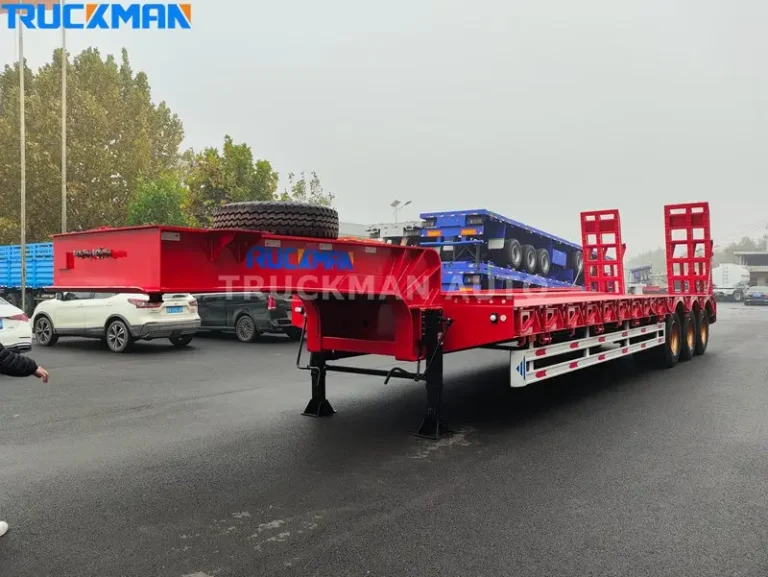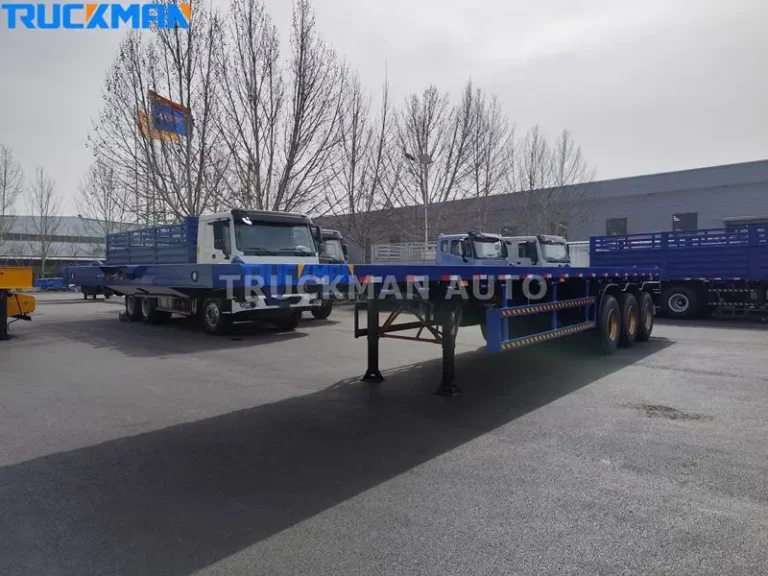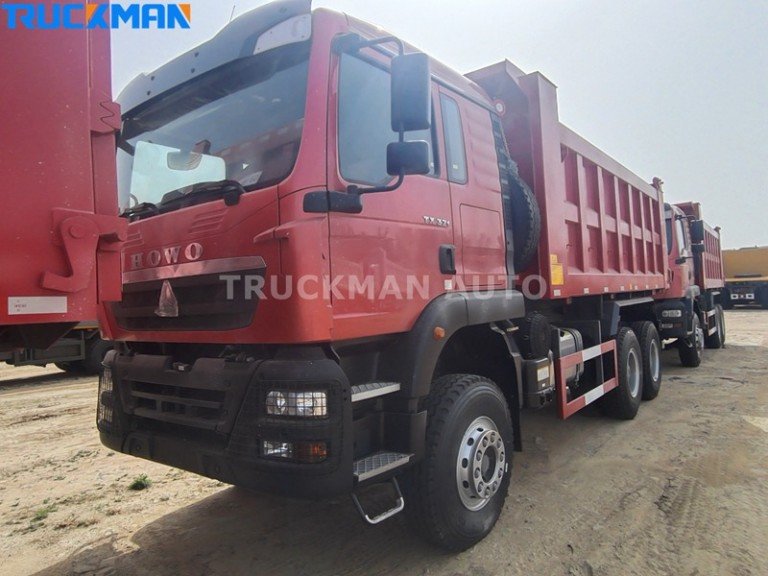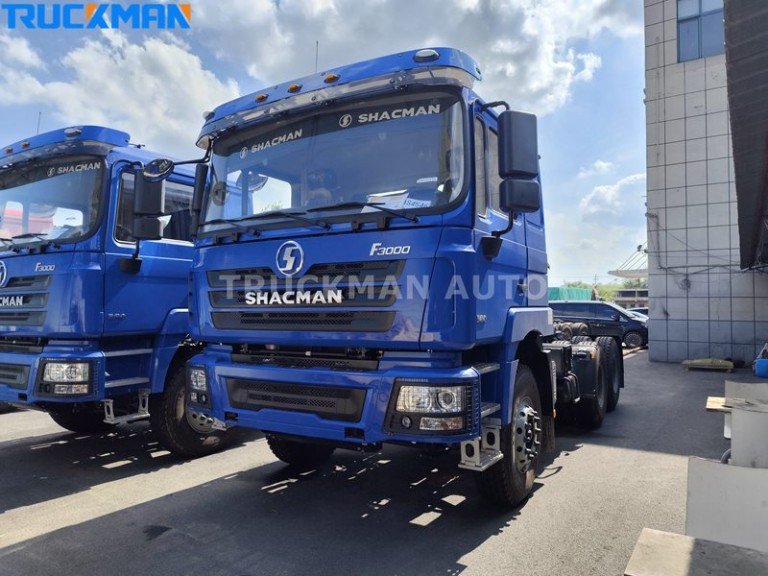Tank trailers are key equipment for transporting hazardous materials, ensuring the safe delivery of substances such as oil and chemicals. Their role in industry, agriculture and commerce is becoming increasingly important as the global economy and energy demand grows. These trailers incorporate advanced designs and technologies, such as multi-compartment and vapour recovery systems, to effectively reduce the risk of leaks, explosions and corrosion. As a specialist manufacturer, Truckman Auto offers a wide range of tank trailers to meet different transport needs. There is no substitute for a tank trailer in transporting hazardous materials, and each type has its specific purpose. In this article, we will introduce the types of tank trailers, selection points and safety measures in detail to help you improve transport efficiency and safety.
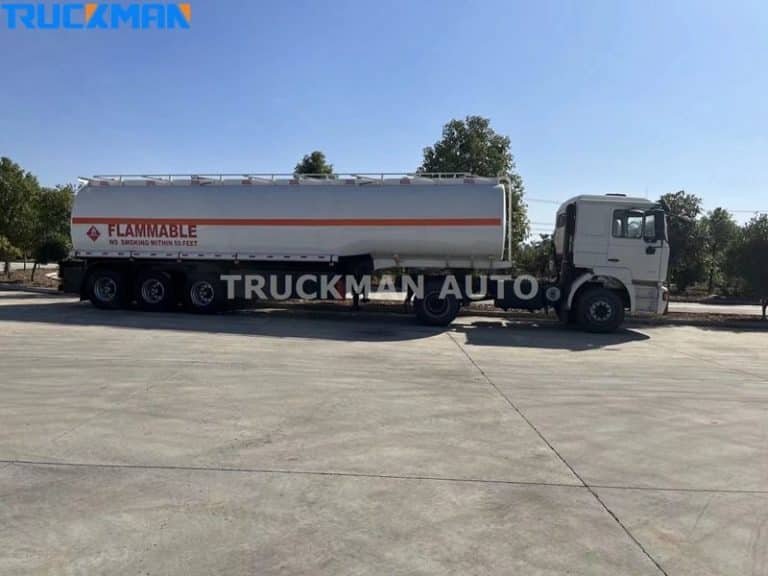
Table of Contents
What Is a Tanker Trailer ?
Tank trailer is a special vehicle designed for transporting dangerous goods. It is widely used in industrial, agricultural and commercial fields, mainly undertaking the task of transporting oil, natural gas, chemicals, food liquids and bulk materials to ensure the safe delivery of goods.
This type of trailer adopts a variety of design structures to adapt to different needs. The baffle type has a perforated internal divider to minimise liquid sloshing. The bulkhead divides the tank into separate storage compartments for easy separation of different cargoes. Smooth-bore tanks are smooth and barrier-free, easy to clean and suitable for single-category transport.
The choice of tank material has a direct impact on transport safety. Lightweight aluminium reduces deadweight. Stainless steel offers high corrosion resistance. Carbon steel is known for its high strength and durability. A reasonable combination of different materials can improve transport efficiency and safety.
According to the differences in transport objects, tank trailers are also subdivided into four professional categories: liquid tankers, gas tankers, powder material tankers and bulk cement trailers. Reasonable selection can not only improve the economic efficiency of transport, but also ensure compliance with the strict safety regulations for the transport of dangerous goods.
What Are The Type Of Tank Semi Trailer ?
Food Grade Tank Semi-trailer: Food grade tank semi-trailer is designed for transporting edible oil/milk/juice and other food liquids. It is made of food-grade stainless steel or aluminium alloy, equipped with multiple compartments and temperature control system to ensure that the transport process meets food safety standards. Typical application scenarios include the whole cold chain transport of milk from farm to processing plant.
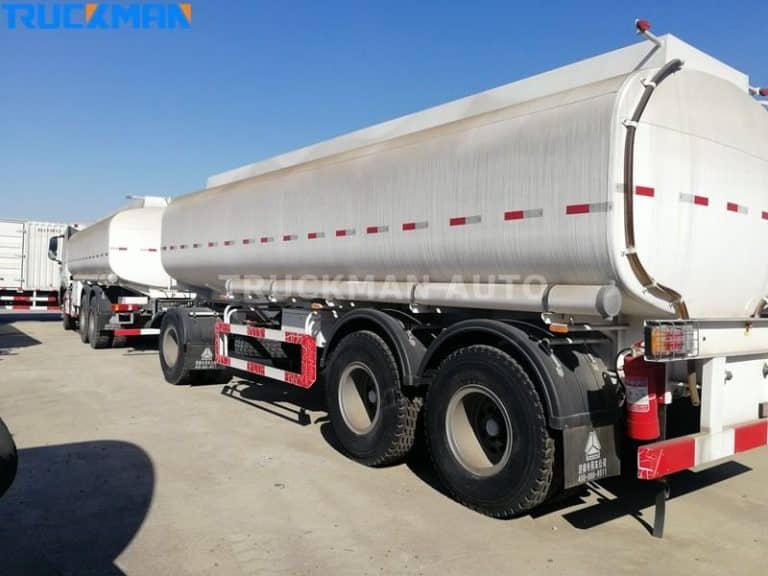
Chemical Transport Tankers: Chemical transport tankers are used for transporting dangerous chemicals such as ethanol/nitric acid/strong alkali. The tanks are made of corrosion-resistant stainless steel or fibreglass, equipped with safety valves and anti-corrosion liners. It is commonly used by pharmaceutical companies to transport acidic raw materials, and the special structure can effectively prevent the risk of leakage.
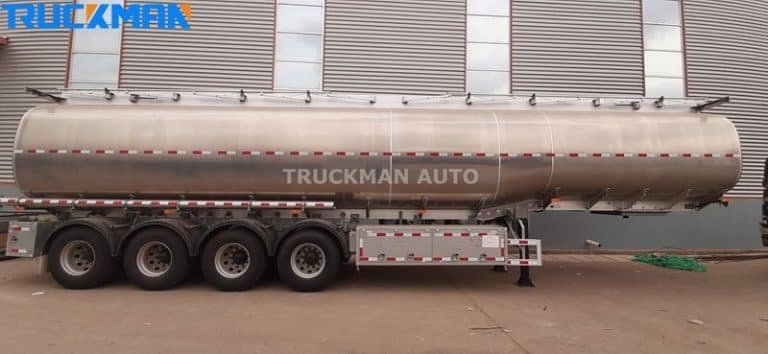
Fuel oil tank semi-trailer: Fuel oil tank semi-trailer mainly transports petrol/diesel/aviation fuel and other energy products. It adopts lightweight aluminium tanks with built-in anti-wave plate and vapour recovery system. It can achieve the transport of multi-species oil products in separate warehouses, and can also be used as a mobile refuelling device, which is commonly used in oil distribution at petrol stations.
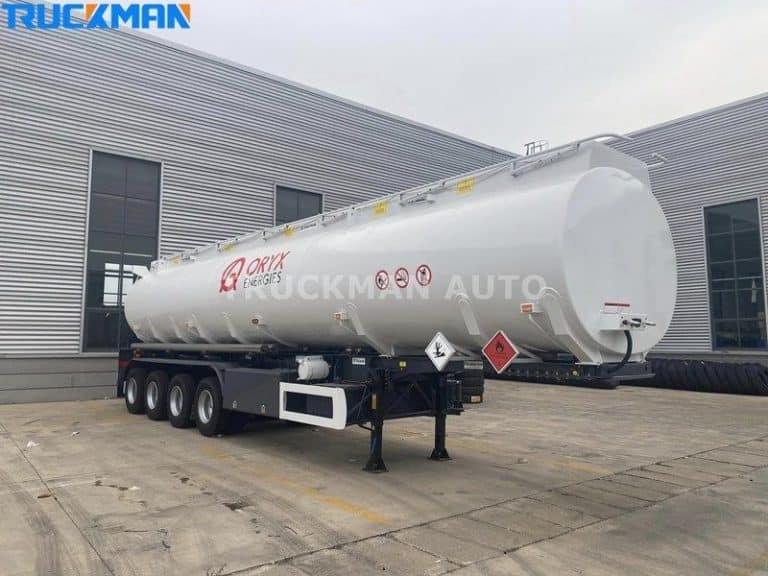
Powder Transport Tanker: The powder transport tanker is designed for cement/lime and other powdery materials. The bottom of carbon steel or aluminium tank is equipped with a pneumatic unloading device, supporting a variety of unloading methods. It is commonly used in construction sites to transport bulk cement, and the special structure ensures the stability of transport.
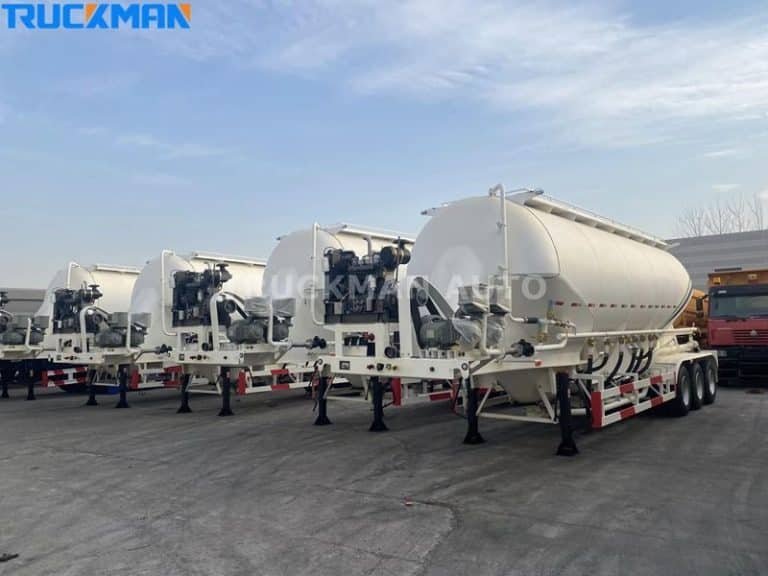
Asphalt special tanker: Asphalt special tanker is equipped with double-layer heating tank and thermal insulation system, which can keep 160℃ high temperature liquid transport. The optimised tank structure is adapted to complex road conditions and is widely used for asphalt distribution on highway construction sites.
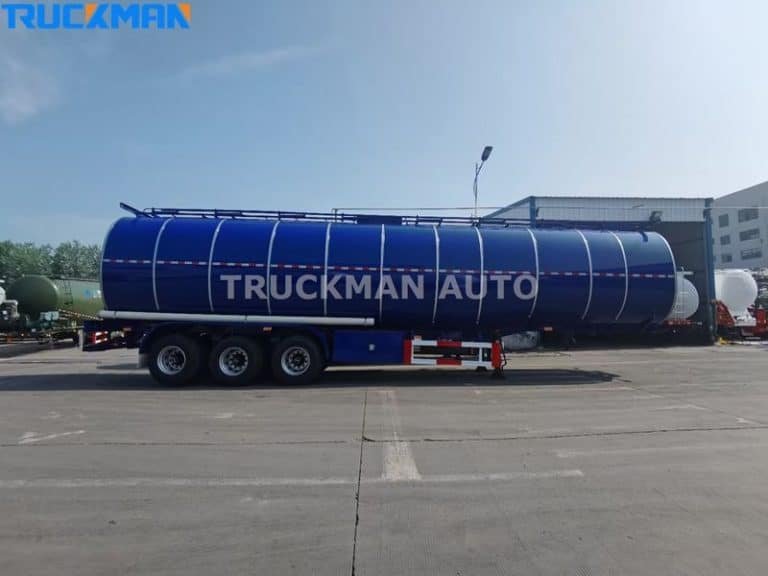
Small Mobile Tanker: Small Mobile Tanker 1,000-3,000 gallon capacity design, suitable for pickup truck towing. Flexible, suitable for farm irrigation, construction site oil supply and emergency response in disaster areas, etc. It can enter areas that are difficult to reach by large vehicles.
Gas Transport Semi-trailer: Gas transport semi-trailer adopts high-pressure carbon steel tank to transport LPG/LNG and other gas fuels. Equipped with multiple safety valves and pressure control systems, it is commonly used for LPG distribution in residential areas to meet the needs of domestic and industrial/commercial gas consumption.
All types of tanker trucks are designed for specific transport needs, with differentiated features in material selection, safety configuration and functional design, which together form an important part of the modern logistics and transport system.
Design and capacity characteristics of tank trailers
The design and capacity of a tank trailer directly determine the safety and efficiency of dangerous goods transport. Below are the key features to ensure efficient and stable cargo transport.
Baffle Design: Reduces liquid shaking and improves driving stability through perforated bulkheads. Commonly used in fuel and chemical trailers to prevent liquid surge during transport.
Bulkhead design: Separates the tank into multiple storage compartments to avoid cargo mixing. Ideal for food-grade and crude oil trailers where multiple liquids can be transported at the same time.
Smooth-bore design: Smooth interior without dividers for easy cleaning and sterilisation. Suitable for single bulk materials such as powdered cement, ensuring smooth unloading.
Stainless steel material: corrosion-resistant and conforms to food hygiene standards, prolonging service life. Widely used in food and chemical trailers to ensure cargo purity.
Aluminium: Lightweight design improves load efficiency and fuel economy. Commonly used in fuel trailers to reduce transport costs.
Carbon Steel: Tough and pressure resistant, withstands high temperature and pressure conditions. Suitable for gas and asphalt trailers to ensure structural strength.
Small Capacity Range: 1,000 to 3,000 gallon capacity for short-distance local distribution. Commonly used in mobile trailers for flexible service to job sites or disaster areas.
Large Capacity Range: Capacities of 5,000 to 11,600 gallons for long-haul needs. Used in fuel and chemical trailers to support bulk transport.
Dry Bulk Capacity Range: Capacities from 560 to 3,120 cubic feet designed for bulk materials. For powdered cement trailers to ensure efficient loading and unloading.
How To Choosing Suitable Tanker Trailer ?
Choosing the right tank trailer requires a number of factors to be considered, both to ensure safe transport and to achieve economic efficiency. Here are the key points to help you make the best choice for your needs and budget:
Cargo: Defining the type of cargo to be transported is the first step. Food-grade trailers are suitable for milk, fruit juices, etc. Chemical trailers are suitable for nitric acid, ethanol and so on. Fuel trailers are for petrol and diesel. Choosing the right trailer can effectively prevent pollution and safety hazards.
Capacity: The capacity of a tank trailer determines transport capacity and cost. Capacity ranges from 1,000 gallons to 11,600 gallons, and price increases with load capacity. Choosing the right model for your volume and budget ensures efficient operation.
Distance: Distance is also an important consideration. Short distance deliveries (e.g., local job sites) can be made with a small trailer. Long-distance transport (e.g. cross-city fuel) requires a large-capacity trailer. When transporting long distances, efficiency and durability are important considerations.
Safety equipment: Dangerous goods transport requires that trailers are well equipped with safety systems. Submarine, emergency shut-off and overflow valves prevent leaks; pressure relief valves are used to manage pressure; and fire extinguishers respond to fires. Ensuring that the trailer meets DOT standards enhances overall safety.
Industry Suitability: Different industries have different needs for trailers. Agriculture typically chooses water tanks or small trailers; the construction industry requires powdered cement or asphalt trailers; and the energy industry relies on fuel and gas trailers. Choosing the more appropriate equipment for the industry helps to optimise transport efficiency.
Regulatory Requirements: Regulatory compliance is critical. Food trailers need to meet FDA sanitation standards, and chemical and fuel trailers should follow DOT-406 or 407 specifications. Also, make sure the trailer and driver are legally qualified (e.g., CDL) to avoid penalties.
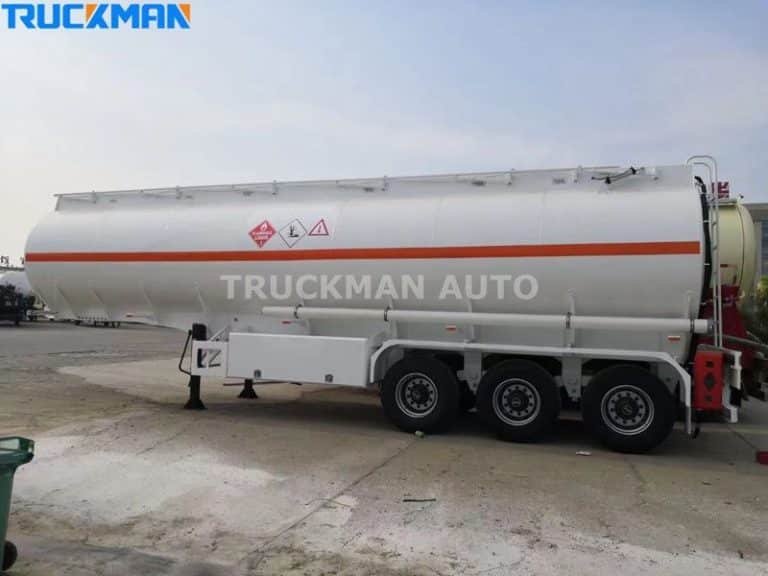
Tanker Trailer Maintenance and Safety Precautions
Tank trailer maintenance and safety measures are directly related to the reliability and safety of hazardous materials transport. The following are key points to ensure trailer performance and compliance.
Tank cleaning: Clean the inside of the tank once a month to remove dirt and debris. Food-grade trailers need to be thoroughly sanitised and chemical trailers need to be rinsed of residue to prolong service life and ensure cargo quality.
Regular inspections: Check valves, hoses and sumps every three weeks to confirm no leaks or wear. Annual comprehensive testing, including brake systems and safety equipment, ensures compliance with DOT standards.
Safety equipment maintenance: test subsea valves, emergency shut-off valves and pressure relief valves monthly to ensure proper function. Check fire extinguishers for expiration dates and keep them readily available to address fire risks.
Work area safety: No matches, lighters or open flames are allowed in the work area. Electrical equipment needs explosion-proof certification to avoid accidents caused by static electricity or sparks.
Standardise the use of tools: use copper or alloy spanners when overhauling to avoid sparks caused by knocking iron tools. Ensure safe operation and reduce the risk of explosion.
Driver training: Drivers need to receive dangerous goods transport training, updated annually, to master the loading and unloading process and emergency handling. Hold CDL certification to ensure compliant operation.
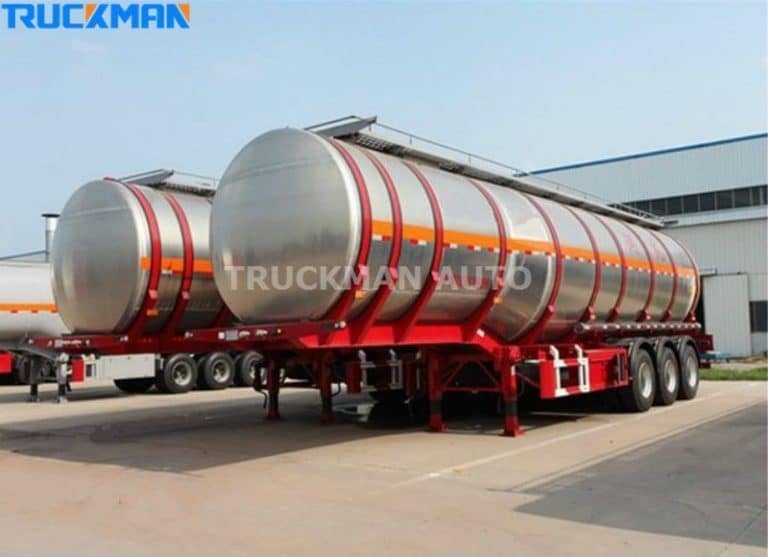
Conclude
There is a wide variety of tank trailer types. From food grade, chemicals, fuels, powdered cement and asphalt, to small mobile and gas trailers, each has its own specialities. They cater for a wide range of needs in a number of industries, including industrial, agricultural and energy. Understanding the uses and characteristics of the different types will help you make the right choice of trailer to improve transport safety and efficiency.
Whether it’s a short-distance delivery or a long-distance haul, the right trailer can optimise costs and keep your cargo safe, and Truckman Auto offers a comprehensive range of solutions to ensure you find the ideal trailer. Contact Truckman today for customised solutions and expert support to make your transport more efficient and safer.

